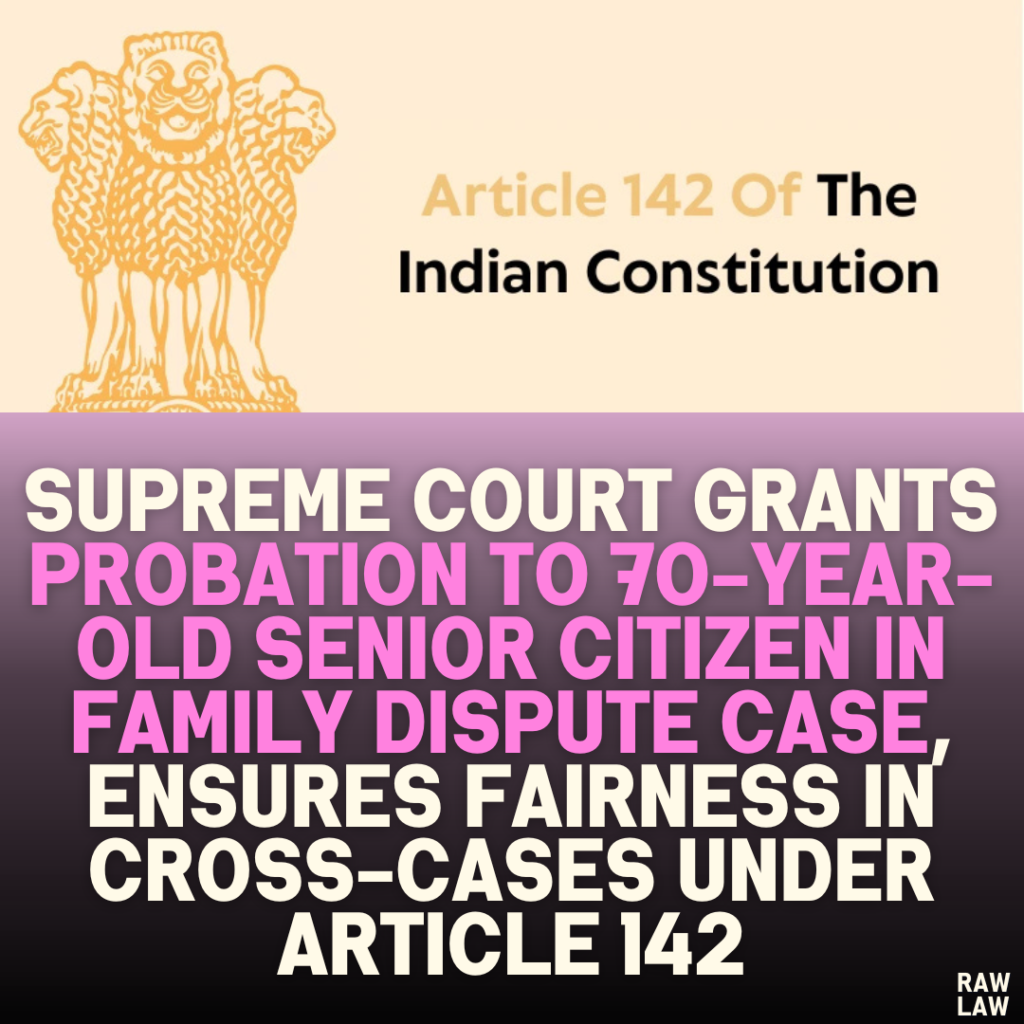Court’s Decision
The Supreme Court allowed the appeal filed by the appellant, aged 70, who had been convicted under Sections 326, 325, 452, and 323 IPC. The Court invoked Section 4 of the Probation of Offenders Act, 1958, and Article 142 of the Constitution to release the appellant on probation. The decision was based on:
- The settlement reached between the parties during the trial of the cross-case.
- The appellant’s advanced age.
- The lack of prior criminal antecedents.
- The prolonged pendency of litigation spanning over 25 years.
The Court directed the appellant to furnish a personal bond of ₹10,000 and maintain peace and good conduct for six months.
Facts of the Case
- Background of the Dispute
The case stemmed from a violent clash between two groups of the same family on January 1, 1993. This incident resulted in two cross-FIRs being filed:- FIR No. 1/1993: Lodged against the appellant and five others, alleging assault.
- FIR No. 9/1993: Lodged against members of the opposing group, accusing them of assault.
- Proceedings in the Cross-Cases
- FIR No. 1/1993: Led to Sessions Case No. 31/1993, where the appellant and others were convicted under various IPC sections, including 326, 325, 452, and 323.
- FIR No. 9/1993: Resulted in Criminal Case No. 584/1998, where the accused were convicted under Sections 148/149 IPC but were released on probation following a settlement between the parties.
- Appellant’s Sentence
The appellant was sentenced to a maximum of six months’ imprisonment under Section 326 IPC and fined ₹5,000. He had already served more than four months of this sentence at the time of appeal.
Issues
- Should the appellant, convicted under IPC Sections 326, 325, 452, and 323, be extended the benefit of probation like the accused in the cross-case?
- Did the High Court err in denying probation despite acknowledging the settlement between the parties?
Petitioner’s Arguments
- The appellant argued that both cases arose from the same incident and involved a family settlement.
- He claimed that denying him probation while granting it to the opposing party created an inequitable situation.
- The appellant emphasized his advanced age (70 years), lack of criminal history, and the inordinate delay in concluding the proceedings.
Respondent’s Arguments
- The State maintained that the High Court’s decision was just and did not suffer from any legal infirmity.
- It opposed granting probation, citing the serious nature of the injuries inflicted on the victims in the appellant’s case.
Analysis of the Law
- Probation of Offenders Act, 1958
- Section 4 of the Act allows courts to release certain offenders on probation instead of imposing a sentence if the circumstances justify such leniency.
- Section 11 empowers higher courts to extend probation benefits where lower courts fail to do so.
- Article 142 of the Constitution
- Grants the Supreme Court the authority to pass orders necessary to ensure complete justice in any cause or matter.
- This power was invoked to reconcile the divergent outcomes of the cross-cases.
- Judicial Observations on Cross-Cases
The Court noted that cross-cases should ideally be tried together to ensure consistency in findings and judgments. This principle, laid down in Sudhir & Others v. State of M.P. and Nathi Lal v. State of U.P., was not followed in this instance, leading to disparate outcomes.
Precedent Analysis
- Sudhir & Others v. State of M.P. (2001):
Established the need for trying cross-cases together to ensure a cohesive understanding of facts and to avoid contradictory rulings. - Nathi Lal v. State of U.P. (1990):
Reinforced the principle that cross-cases arising from the same incident should be adjudicated together to maintain judicial consistency.
These precedents were instrumental in shaping the Court’s approach to granting probation in this case.
Court’s Reasoning
- Cross-Cases and Family Settlement
The Court emphasized that both cases arose from the same incident, with each side filing complaints against the other. A settlement reached in the cross-case indicated a mutual resolution of the family dispute. - Equity and Justice
The Court found it inequitable to deny the appellant the benefit of probation when the opposing party had been granted the same relief under the Probation Act. - Prolonged Litigation and Appellant’s Circumstances
The Court considered the appellant’s advanced age, lack of prior criminal history, and the undue delay in resolving the case as factors favoring probation. - High Court’s Approach
The High Court’s refusal to extend probation was deemed inconsistent with the principles of justice, especially in light of the settlement and the reduced charges against the appellant.
Conclusion
The Supreme Court allowed the appeal and granted probation to the appellant. The key directives included:
- The appellant must furnish a personal bond of ₹10,000 and maintain peace and good conduct for six months.
- The Court imposed ₹100 as prosecution costs under Section 5 of the Probation Act.
Implications
- Reinforcing Equity in Cross-Cases
The judgment underscores the importance of equitable treatment in cross-cases, particularly when both parties are equally culpable. - Promoting Rehabilitation Over Punishment
By extending the benefit of probation, the Court highlighted the Probation Act’s rehabilitative intent, especially for senior citizens and first-time offenders. - Judicial Consistency
The decision serves as a reminder of the need for consistent outcomes in cross-cases to uphold public confidence in the judicial process.




Pingback: Supreme Court: Filing Memorandum Under Section 8 Not Mandatory for Unregistered MSMEs to Invoke Section 18 Remedies; Matter Referred to Larger Bench - Raw Law